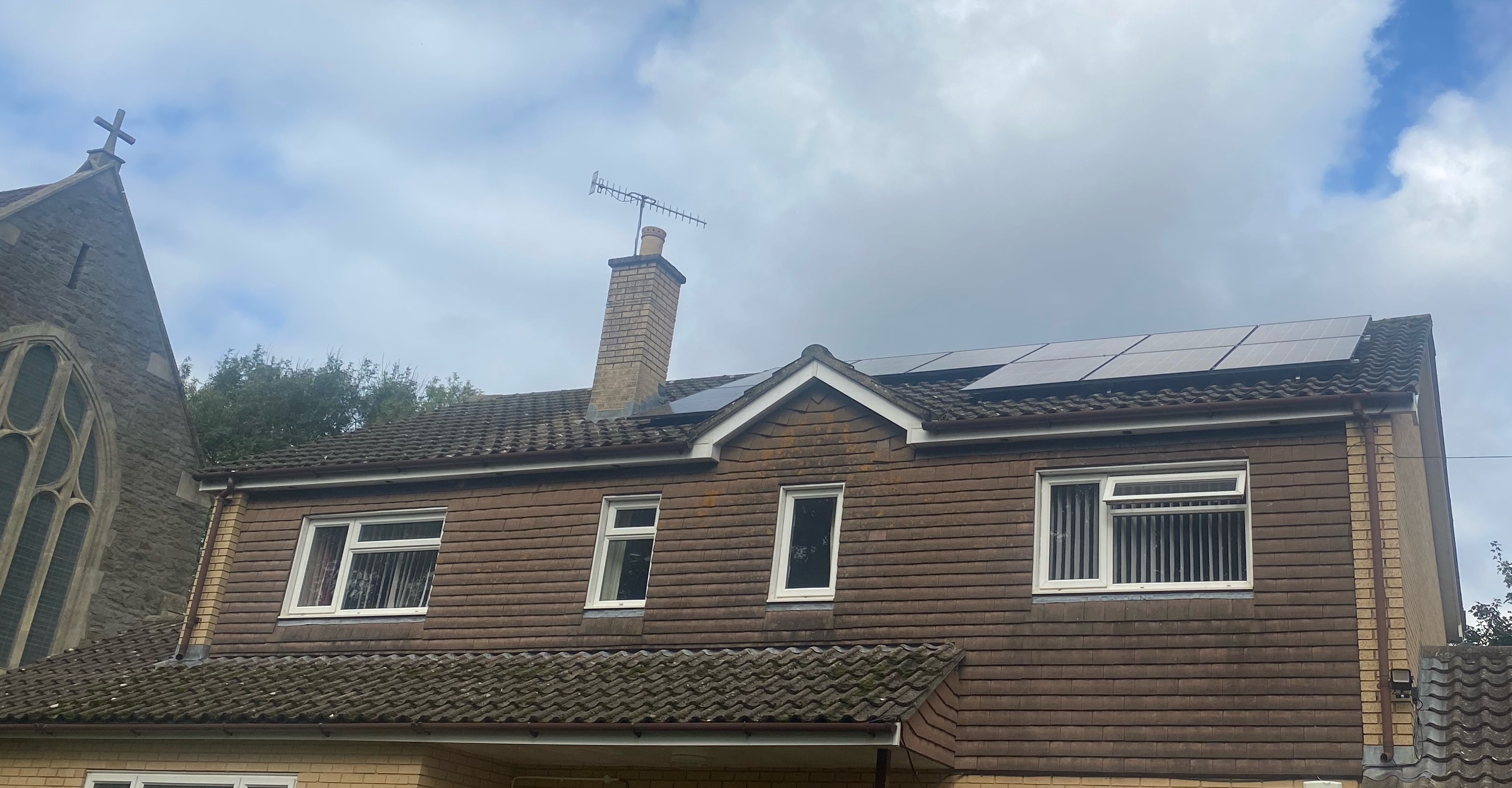A vicarage in a deprived area of Bristol has been transformed by the installation of solar panels, insulation and an air source heat pump.
Formerly, the 1970s vicarage, which had gas central heating, “was cold on a warm day”, according to the family.
Accompanied by Basil the dog, they “were often found under blankets watching the telly”. The gas heating system “wasn’t fit for purpose”.
Then, this summer, the Bristol Diocese began a programme of upgrading 130 vicarages to make them more fuel efficient, as part of the Church of England’s ambition to be net zero carbon by 2030.
With the family at home, alongside a Ukrainian family who have also been living in the vicarage, work began to improve the house’s fuel efficiency. In went cavity wall insulation and loft insulation.
Solar panels were fitted on the roof. And crucially, the old gas heating system was replaced with new pipework, radiators and an air source heat pump.
“We work in one of the most deprived areas of Bristol,”. “We get on really well with the property department at the diocese. I genuinely think that they felt sorry for us.”
It wasn’t plain sailing. The installation took longer than anyone had expected. Having people in the house while the work was happening posed challenges. So did the concrete floors. The whole thing was at times stressful.
“A whole lot of gubbins” was installed in a bedroom wardrobe, while the air source heat pump itself was set up outside. Although not necessary with every installation, all the pipe work was replaced.
“We can’t avoid the fact that the installation was painful”, “but the end result means we will be comfortable in our own home and save too.”

Saving money on bills
While they haven’t turned the heating on yet, the couple know the benefits to expect.
“The main benefit is that it will be energy efficient”. “It will cost significantly less. We think that our bills will be halved, if not more. It will need less energy to heat the house due to the improvements to the building, and alongside an all-electric highly efficient heating system it means that we can be net zero. We are environmentally concerned people, and so this is important to us.”
Before this summer’s installation, typing in gloves while working at home wasn’t unknown. Visitors were given extra blankets. Apologies were made for the cold.
“Now, we are looking forward to being warm,” she says. “There will be a bit more to spend on the grandchildren this Christmas.”
The reduction in cost, due to generating their own electricity through solar panels, is already noticeable on the smart meter that sits on the desk. On a wet and windy early autumn day, the couple have spent £1.60 on heat and light. Before the recent installations, this was generally £5-7 per day, and in the winter £12-13, with £20-25 per day not being uncommon.
“I’d sit at the desk and look at the smart meter just watching the money go”. Now her attention is elsewhere. “Keeping constant heating is just lovely, amazing”.
Faith is about caring for creation
But the home’s move to net zero carbon has been an important part of the couple’s faith and witness.
“The faith that we follow is about caring for all creation”, “so we must be concerned with the environment. We have to look after it, as we would look after people. It’s a very important part of who we are.”
This vicarage is just one of 150 in the Diocese of Bristol that will be upgraded by 2030. Adam Pinder, Property Surveyor for the Diocese, is clear that there are real benefits despite the challenges.
“The main benefit is that the vicarage will have a significantly reduced carbon footprint. Additionally, this installation will help demonstrate to clergy members that the new technology is easy to use and not as complicated or demanding as some might fear,” he says.
The family back this up. The system is totally silent according. “The water is so much hotter, and the bath fills up quicker. I don’t have anything bad to say about it. We are totally spoiled.”
“We would encourage people to do this. You get benefits all around, from being more fuel efficient to taking the pressure off your income, and for many clergy families, that’s a reality.”
They are looking forward to some simple pleasures as the colder months come around: not having to apologise for the cold, and not handing out extra blankets for visitors.
“Being cold is miserable”, “though it makes you empathetic to others’ cold. We will be a little bit more comfortable. We might sit still a bit more and we’ll be able to invite people in.”
What’s involved?
If you’re interested in mirroring what’s happened in this vicarage in your home, here are the costs to provide you with some context.
The overall cost of the project: £39,000
Air source heat pump £20,100
Removal of fireplace and oven £ 4,300
Installation of solar panels £9,100
Cavity and loft installation £5,500
To find out more about what the Diocese of Bristol is doing or read our policy document go here.
The Diocese of Bristol is committed to addressing the environmental challenges that our community faces and in November 2019 declared a climate emergency. As part of this the diocese is working towards achieving a net zero carbon position by 2030.
Climate change may be the most serious issue ever faced by human communities. All forms of life across the planet are threatened and the poorest nations are set to suffer most, that's why this is a justice issue.